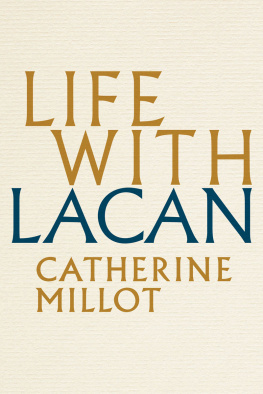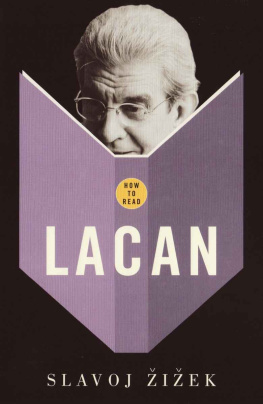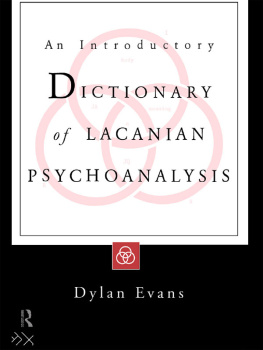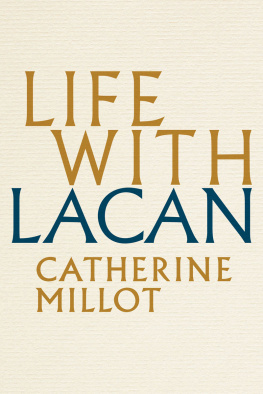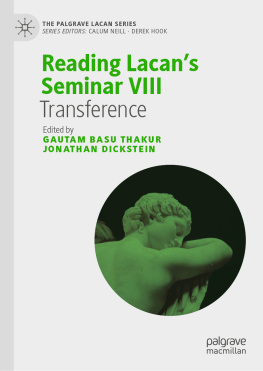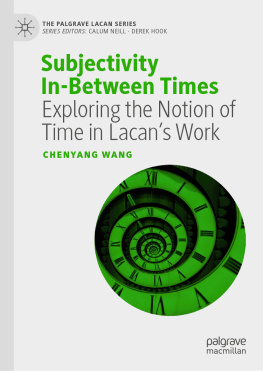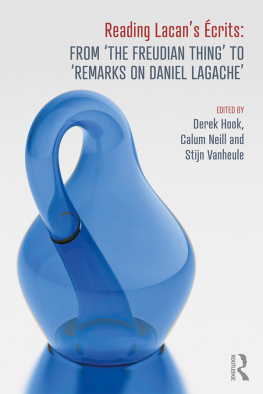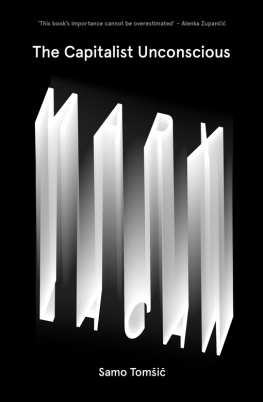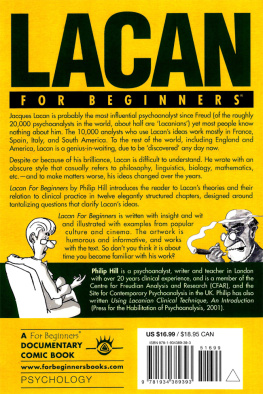Contents
Guide
Pages

Life with Lacan
Catherine Millot
Translated by Andrew Brown
polity
First published in French as La vie avec Lacan ditions Gallimard, 2016
This English edition Polity Press, 2018
Polity Press
65 Bridge Street
Cambridge CB2 1UR, UK
Polity Press
101 Station Landing
Suite 300
Medford, MA 02155, USA
All rights reserved. Except for the quotation of short passages for the purpose of criticism and review, no part of this publication may be reproduced, stored in a retrieval system or transmitted, in any form or by any means, electronic, mechanical, photocopying, recording or otherwise, without the prior permission of the publisher.
ISBN-13: 978-1-5095-2505-8
Library of Congress Cataloging-in-Publication Data
Names: Millot, Catherine, author.
Title: Life with Lacan / Catherine Millot.
Other titles: Vie avec Lacan. English
Description: English edition. | Medford, MA : Polity, 2018. | Includes bibliographical references and index.
Identifiers: LCCN 2017036535 (print) | LCCN 2017047063 (ebook) | ISBN 9781509525058 (Epub) | ISBN 9781509525010 (hardback)
Subjects: LCSH: Lacan, Jacques, 1901-1981. | Millot, Catherine. | Psychoanalysts--France--Biography. | Authors, French--20th century--Biography. | Authors, French--21st century--Biography.
Classification: LCC BF109.L28 (ebook) | LCC BF109.L28 M553 2018 (print) | DDC 150.19/5092 [B] --dc23
LC record available at https://lccn.loc.gov/2017036535
A catalogue record for this book is available from the British Library.
The publisher has used its best endeavours to ensure that the URLs for external websites referred to in this book are correct and active at the time of going to press. However, the publisher has no responsibility for the websites and can make no guarantee that a site will remain live or that the content is or will remain appropriate.
Every effort has been made to trace all copyright holders, but if any have been inadvertently overlooked the publisher will be pleased to include any necessary credits in any subsequent reprint or edition.
For further information on Polity, visit our website:
politybooks.com
There was a time when I felt that I had grasped Lacans essential being from within that I had gained, as it were, a close sense of his relation to the world, a mysterious access to that intimate place from which sprang his relation to people and things, and even to himself. It was as if I had slipped inside him.
This feeling of grasping him from the inside was accompanied by the impression that I myself was comprehended, in the sense of being completely included within his own understanding, which extended far beyond my ken. His mind with its breadth and depth his mental world, enclosed mine in the way a bigger sphere contains a smaller one. I came across a similar idea in the letter where Madame Teste talks about her husband. Just as she felt transparent to her husband, I felt transparent to Lacan, convinced that he had an absolute knowledge of me. I had nothing to hide, no mystery to keep from him: this gave me complete freedom with him. But it went further than that. An essential part of my being was vouchsafed to him; he would watch over it, I was relieved of it. I lived at his side for years, in this state of lightness.
One day, however, he was busy manipulating those rings of string that were such a knotty problem for him, when he abruptly told me: See that? Its you! Like anyone, like any random person, I was the real that escaped his grasp and that gave him such a headache. I was overwhelmed by a sudden feeling of respect for what within me resisted him, in the way that the real alone resists.
When I say his being, what do I mean? His particularity, his singularity, what in him was irreducible, the weight of his reality. When I now try to grasp his being anew, its his power of concentration that I recall, his almost permanent concentration on the object that he was thinking of and that he never let go. In the end, he had simplified himself to an extreme degree. In one sense, that was all he now was: a pure concentration that merged with his desire, and made this desire tangible.
I recognized this concentration in the way he walked, headfirst, as if borne along by his weight, catching his balance in every step he took. But this very instability gave one a sense of his determination, he would never deviate an inch from his route, he would keep right on to the end, always moving straight ahead, without paying any attention to what might get in his way he seemed to ignore such obstacles (which in any case were beneath his contempt). He liked to remind people that his star sign was Aries, the Ram.
The first time I saw him walking was on the paths of the Cinque Terre in Italy, where, after lunch, in the lazy summer heat it was August he would drag his entourage after him. They did not dare protest. He marched on ahead, with grim determination. The risks of sunstroke for himself or the rest were of no account. So we walked on, from one coastal village to the next, across the hills overlooking the sea, returning in the little local train.
That summer, he went water skiing in the narrow bay of Manarola. Firmly gripping the waterski handle, and without ever leaving the boats wake, here too he went straight ahead. The following winter, on the slopes of the Tignes ski resort, the only manoeuvre he seemed to know was the schuss. This had led to him breaking a leg a few years earlier. That was the time when Gloria, his secretary, had started to work for him. Being immobilized put him in a furious temper; he was like a bear with a sore head, and he took it out on the poor woman, who lost patience with him. He was lying stretched out on his bed, his leg in plaster; she grabbed hold of his leg, lifted it up and then suddenly dropped it. Taken aback by this womans refusal to be intimidated, Lacan immediately changed his tone and suddenly took an interest in her, asking her questions about where she was from and her whole life story. That day, a bond of unshakeable loyalty was forged between them.
Later on, I would often go with him from his country house in Guitrancourt to the golf course in which he held shares, though he never actually played. The golf course was just a destination for his walks. But walks isnt really the word. Here again, he would march straight off, his head lowered, through woods and fields, getting entangled in the thickets or bogged down in the greasy clods of freshly ploughed earth, never straying from his route. Indeed, I wondered how he knew which way to go, but he never got lost. I would follow along in my wellies, while he unconcernedly got his elegant, custom-made shoes covered in mud. Once he had reached the golf course, he would phone Jesus, his caretaker at Guitrancourt his kindly Jesus as he liked to call him asking him to come and take us home in his car.
It was just the same when he drove: his head forward, gripping the steering wheel, treating obstacles with contempt, as one of my women friends noted, never slowing down even for a red light and as for observing the right of way well, lets not go there. The first time, on the autoroute, travelling at some 120 mph, I had a fit of the giggles which I suppressed only with difficulty. But even if Id burst out laughing, hed never have noticed; he was concentrating too hard.
One day, however, he was forced to slam the brakes on so as not to crash into the car ahead of us which had suddenly slowed down. But braking wasnt his forte; the car skidded, and that put an end to the sense of invulnerability that had filled me when I was at his side. I started to feel scared, and it was torture to travel as his passenger. There was no point in imploring him to slow down. Once, his stepdaughter Laurence had come up with a bright idea: she asked him to drive more slowly so that she could look at the countryside. He told her: Just pay more attention.

